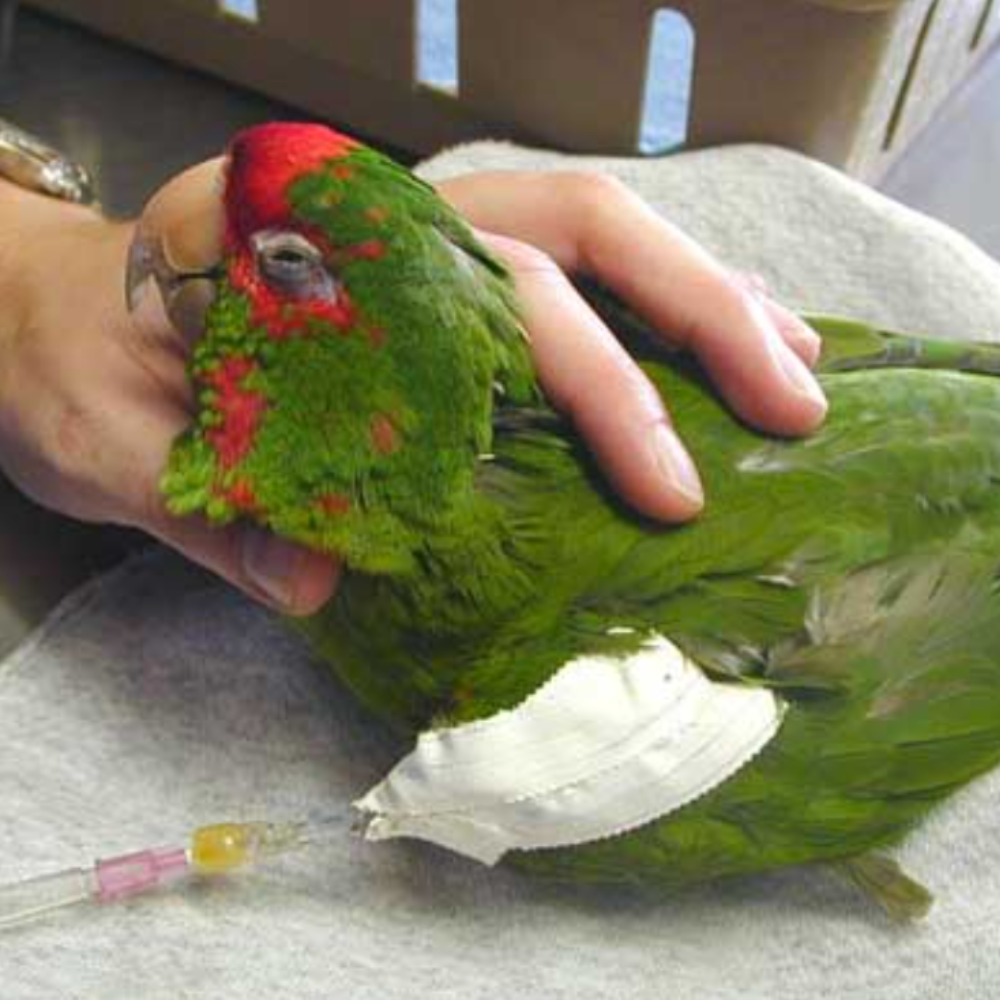Avian vets report that one of the most common and deadliest injuries pet birds experience is an attack by another household pet.
Any animal attack is life threatening to your pet bird and requires IMMEDIATE veterinary care. Even if your bird looks normal or it was light physical contact.
Avian vets report that they see a lot of birds that got attacked by an animal. Of course, we often think that dog and cat attacks are the most common, but attacks from another pet bird are very common and dangerous problem, too. Mixing ferrets and birds is not a good idea, either. And, there have even been reports of wild raccoon's and stray animals entering through doggy doors to attack birds. Birds in outdoor aviaries can also be a target to raccoon's and hawks.
Your bird has experienced an animal attack: This is a nightmare situation for any bird owner, and requires that you maintain an ice cool head, whilst still moving quickly and taking control of what is a very dangerous situation for your bird. You will be dealing with several main stages: Getting your bird out of danger and away from the attacking animal, stabilizing any wounds, breaks or dislocations that may have occurred, and lastly immediately transporting your bird to the vet's for a check up and possible antibiotic treatment.
Step 1: Get your bird out of danger: First check to make sure that you are not in danger yourself! If you are dealing with an aggressive dog then you may need an assistant who can help to retrieve your bird. If possible get the dog's or cat's owner to help you. If you are by yourself try to startle the aggressive animal into dropping your bird by making loud noises or by spraying water into the onto it . If your dealing with a large animal , grab a stick so that you can defend yourself if the animal decides to attack you. If the animal is large and very aggressive then you may have to get assistance. Remember, you can't help your bird if you have been incapacitated yourself! Next, if the bird has not been dropped, immobilize the aggressor animal by holding it by the scruff of the neck, and gently remove your bird, taking care not to squeeze the bird in any way. The bird probably has both external and internal injuries so be as gentle as possible.
Step 2: Follow the 4 C's.
C-lap your hands! : If you have them handy, latex gloves are a must for dealing with injured or wounded birds. Your bird's system will be dealing with enough issues without you adding unnecessary pathogens because you decided to treat your bird with dirty hands.
C-heck for danger: You're going to be of no use to your bird whatsoever if you are incapacitated yourself. Make sure that you've removed the source of the danger completely before giving treatment to your bird. That means making sure that the offending cat or dog has been completely removed from the area, and ideally has been secured by a rope to prevent the animal from returning.
C-all the vet: Unfortunately the mouths of dogs , cats , other birds and all critters are full of bacteria that are very deadly to your bird. Even if your bird seems fine afterwards you will need to take your bird to the vet to get antibiotics administered. It is very common for a bird who remains untreated after a cat or dog attack to die within 24 hours of septic shock caused by bacteria from the attacking animal.
Call your vet straight away to prepare them for your bird to come in to be seen on an emergency basis. It'll also give you the chance to ask for any on-the-spot advice that they may have to stabilize your pet before bringing it in.
C-alm yourself: Birds are very social by nature, and are sensitive to the emotions of others. If you are panicking and distraught your bird will pick up on this and will respond in kind. This can increase blood pressure, increasing rate of bleeding, or make your injured bird very difficult to deal with. Worse, you panicking could cause your bird to go into shock which can easily prove fatal.
Take a couple of deep breaths and calm yourself.
** A word of re-assurance ** There is a myth that a bird with a broken leg or wing should be put down. That is simply not true. While a permanent injury is far from ideal, the worst case is that your bird will still live a long happy life with only one functional wing or leg, hopping around!

We created a hospital cage for our bird with a low lying perch to immediately transport her to the vet when her flock-mate bit her beak.
Step 3: Stop Bleeding and Stabilize Your Bird. This is where a first aid kit for your bird comes in very handy, as it will be difficult to locate these items on the fly. It is a must have your your first aid kit well stocked and easily retrievable.
First thing is to deal with any bleeding. Locate the source of bleeding. Clean any blood with warm water and then put Super Clot Gel on to the wound to clot the blood. This gel has clotting properties plus antibiotics and analgesic to numb the pain. Worst case, use common corn starch or flour to clot the bleeding. Apply it to the source of the wound and if necessary, apply pressure for 1-2 minutes. Bird's have little blood compared to humans and so the loss of a comparatively small amount of blood can prove fatal. Clot the blood first before you do anything else.
Next, you need to deal with any breaks or dislocations. You are not trying to do anything other than get the limbs secured and immobile so that your bird can't do itself any more damage before the vet get to treat him or her. Try to manipulate any broken or dislocated limbs into roughly the right position, then bind loosely, preventing further movement but not restricting blood flow to the limb. If you have an Avistraint in your First Aid Kit, use it, but if not, towel your bird. Do not remove the cloth once placed as you may aggitate your bird. Be very careful to not restrict your birds ability to breath.
Once this has been done, place you bird in a warm, draft free travel cage and transport it to the vet immediately. As stated before, death by septicaemia within 24 hours from infection from the claws and saliva of both dogs and cats is very common, and so even if you think that your bird is fine, you should take him or her to the vet for a checkup.
There are multiple issues with an animal attack, including external and internal injuries. Your experienced avian vet will check for potential broken bones or dislocations, as well as determine how much blood loss your bird has experienced as a result of the bite. Better to be safer than sorry. As a final note, remember that time is of the essence here and that you should move quickly to stabilize your bird and get it to the Vet ASAP! NEXT STEPS: Prepare your Bird First Aid Kit Now
i>Hey, please leave a comment or share this on your social media if you love this post!






4 comments
Kristina Francke
My bird (sun conure) keeps attacking my dogs and the cat, especially my big dog (great Dane). The dog is really nice about it and never snaps back just tries to get away as fast as possible. But it’s really upsetting him. It’s gotten so bad the dog can’t even come into my room anymore without getting swooped on and pecked in the back. What can I do to get my bird to tolerate the other animals? They all accepted him into the house and now he turned into a monster bird.
My bird (sun conure) keeps attacking my dogs and the cat, especially my big dog (great Dane). The dog is really nice about it and never snaps back just tries to get away as fast as possible. But it’s really upsetting him. It’s gotten so bad the dog can’t even come into my room anymore without getting swooped on and pecked in the back. What can I do to get my bird to tolerate the other animals? They all accepted him into the house and now he turned into a monster bird.
Mari
My african grey was attacked by my dog a week ago. The vet gave him pennicillin and pain meds. His meds is now finish but he leg/foot is injured and looks a bit swollen now. He is eating and drinking as usual but doesnt talk much like before. I took down his perchers and only left one very low to the cage floor for him to climbed on. He is now 2 days back in his cage I put him for a week in a smaller cage but he is ow more happy in his big cage. He climbed up and dow the cage with his injured leg. What can I do more for him so he doesnt injured his leg more? And since his meds is finish should I give him something else for his leg
My african grey was attacked by my dog a week ago. The vet gave him pennicillin and pain meds. His meds is now finish but he leg/foot is injured and looks a bit swollen now. He is eating and drinking as usual but doesnt talk much like before. I took down his perchers and only left one very low to the cage floor for him to climbed on. He is now 2 days back in his cage I put him for a week in a smaller cage but he is ow more happy in his big cage. He climbed up and dow the cage with his injured leg. What can I do more for him so he doesnt injured his leg more? And since his meds is finish should I give him something else for his leg
Monika
My adult parakeet was attacked by my dog. Almost all his feathers were plucked out, and he seems fine. We put some antibiotics on the wounds. There seems to be dried blood. It’s really late at night and no vets are open. Should I wait or just treat him on my own?
My adult parakeet was attacked by my dog. Almost all his feathers were plucked out, and he seems fine. We put some antibiotics on the wounds. There seems to be dried blood. It’s really late at night and no vets are open. Should I wait or just treat him on my own?
Inaya Robinson
My baby parakeet got injured by my dog and it’s not moving
My baby parakeet got injured by my dog and it’s not moving